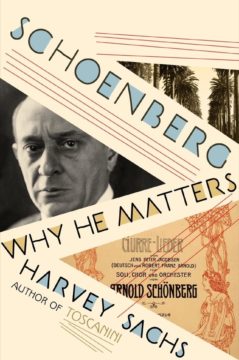Judith Finell at the LARB:
 ARNOLD SCHOENBERG (1874–1951) was a pivotal figure in the development of 20th-century music. Of the thousands of composers who came before and after him, he stood alone both as the embodiment of the high Romanticism of the 19th and early 20th centuries led by Gustav Mahler, Richard Wagner, and Richard Strauss, and as a rebel who broke down the gates of traditions that had ruled music composition for three centuries. After he spent his childhood in pre–World War I Vienna in a Jewish ghetto, Nazi antisemitism drove him from Europe, eventually to land in Los Angeles, where he stayed to the end of his life, teaching first at USC and then UCLA.
ARNOLD SCHOENBERG (1874–1951) was a pivotal figure in the development of 20th-century music. Of the thousands of composers who came before and after him, he stood alone both as the embodiment of the high Romanticism of the 19th and early 20th centuries led by Gustav Mahler, Richard Wagner, and Richard Strauss, and as a rebel who broke down the gates of traditions that had ruled music composition for three centuries. After he spent his childhood in pre–World War I Vienna in a Jewish ghetto, Nazi antisemitism drove him from Europe, eventually to land in Los Angeles, where he stayed to the end of his life, teaching first at USC and then UCLA.
A generational original, Schoenberg forged an entirely new path and language for musical expression. He called it the 12-tone or dodecaphonic system, built on all 12 pitches in the Western scale, rather than the traditional hierarchical seven. Ironically, his impact even on his most ardent disciples, Anton Webern and Alban Berg, was so provocative that they built on his techniques in divergent directions.
more here.
